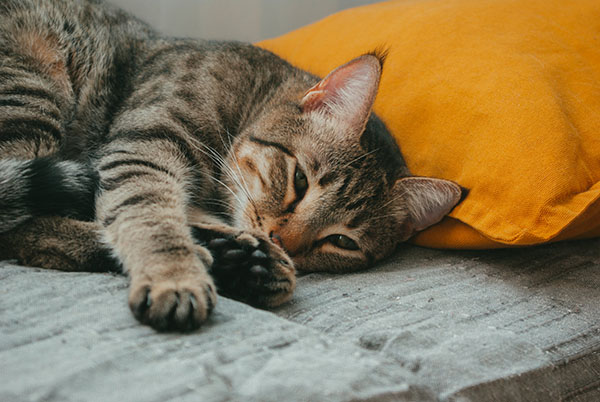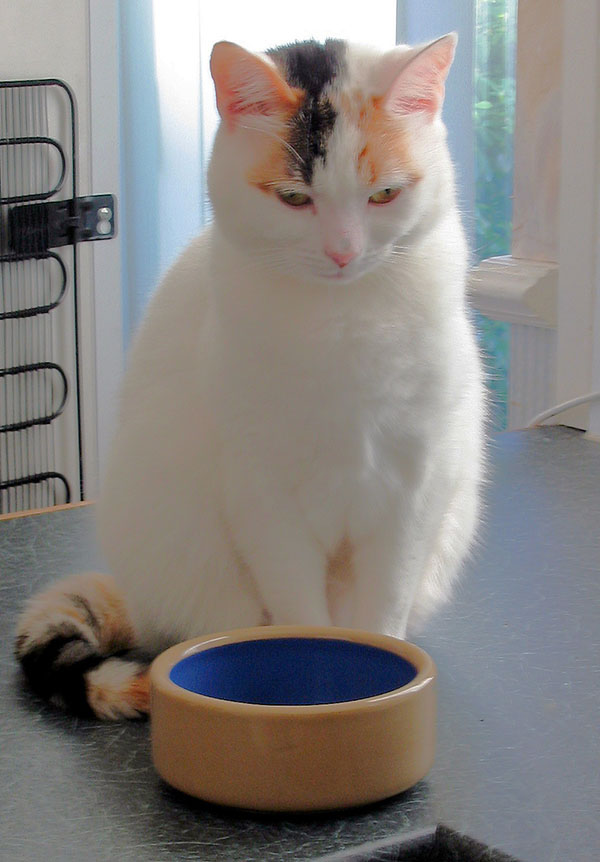For the health and happiness of our cats, it's vital to know about their nutritional requirements. A frequent question for cat owners is the duration their furry friends can safely spend without eating. While cats are known for their independence and sometimes finicky eating habits, prolonged periods without eating can be a sign of underlying health issues and can lead to serious complications.
In this post, we will dive into how long cats can go without food, exploring the risks associated with not eating, the potential causes of a decreased appetite, and when it becomes essential to seek veterinary care.
How long can cats go without food?
Cats typically should not go without food for more than 24 to 48 hours. Prolonged fasting can lead to hepatic lipidosis, a serious liver condition. The duration can vary based on factors such as the cat's age, size, and overall health.
Kittens, elderly cats, and those with preexisting health conditions may encounter complications faster. While a brief loss of appetite can occur due to factors like stress or minor illnesses, consistent food refusal warrants prompt veterinary attention.
If your cat has stopped eating, keep in mind early intervention is crucial in preventing potential health issues arising from extended periods without food, ensuring the well-being of the pet cat.
What Are the Health Risks When Cats Stop Eating
Hepatic Lipidosis (Fatty Liver Disease): This serious condition can develop when a cat doesn't eat for an extended period. The cat's body starts breaking down stored fat for energy, overwhelming the liver with fat, which impairs its function.
Dehydration: Without cat food, cats may also reduce their water intake or stop drinking water, leading to dehydration. This could lead to kidney problems and other health issues.
Muscle Wasting: Lack of protein intake from not eating leads to muscle wasting, weakening the cat's overall condition and ability to recover from illness.
Nutritional Deficiencies: Prolonged lack of eating results in deficiencies in essential nutrients, vitamins, and minerals, impacting the cat's immune system and overall health.
Gastrointestinal Problems: Not eating can disrupt the normal function of the gastrointestinal system, leading to issues like constipation, upset stomach, and hepatic lipidosis.
Behavioral Changes: Lack of nutrition can affect a cat's mental health, leading to lethargy, depression, and other cat behavior changes.
Weakened Immune System: A cat that isn't consuming food properly will experience a weakened immune system, rendering it more vulnerable to infections and illnesses.
Metabolic Imbalance: A lack of cat food can disrupt the normal balance of electrolytes and acids in the body, which can impact various bodily functions and organ systems.

When To See A Vet
If your cat stops eating, it's important to consult a veterinarian within 24 hours. Prompt veterinary attention is crucial, as even a short period without food can lead to serious health issues in cats, especially in those who are overweight or have preexisting conditions.
Be alert for accompanying symptoms such as vomiting, diarrhea, lethargy, or changes in behavior, as these can indicate underlying health problems. Early intervention can prevent complications like hepatic lipidosis, a severe liver condition. A veterinarian can diagnose the cause of the appetite loss and provide appropriate treatment to ensure your cat's health and well-being.
Reasons Cats Stop Eating
There are several reasons why a cat might stop eating, ranging from minor issues to more serious health concerns:
Dental Problems
Dental problems are a common reason for a cat's decreased appetite. Issues like gingivitis, periodontal disease, tooth abscesses, or tooth decay can cause significant pain and discomfort, making eating a challenging and painful experience. Cats with dental issues might approach their food with interest but then hesitate or withdraw due to oral pain. They may also drool excessively, have bad breath, or show visible signs of discomfort around their mouth.
Managing dental problems in cats requires a combination of at-home care and professional veterinary treatment. Regular dental check-ups are essential for early detection and treatment of dental issues. Veterinarians can perform professional cleanings, extractions, or other dental procedures under anesthesia to resolve the underlying problem.
At home, owners can aid in dental health maintenance by providing dental care diets, special treats, or toys designed to reduce plaque and tartar buildup. In cases of dental pain, a vet might also recommend pain relief medications or a temporary shift to canned food to encourage eating until the dental issue is resolved.
Illness
Illness is a significant factor that can lead to a cat's loss of appetite. Conditions ranging from common infections to chronic diseases like kidney failure, diabetes, or gastrointestinal disorders can affect a cat's desire to eat. Symptoms accompanying these illnesses, such as nausea, pain, or general discomfort, can further diminish their appetite. Sick cats with respiratory infections may have a reduced sense of smell, which is crucial for their appetite.
Addressing a cat's refusal to eat due to illness requires a veterinary diagnosis to identify the underlying cause. A veterinarian will perform a comprehensive examination, potentially involving blood tests, urinalysis, or imaging studies. Treatment varies depending on the diagnosis but may include medications, dietary changes, or, in some cases, hospitalization for more intensive care. Supportive care at home, such as offering palatable, easy-to-eat foods and ensuring a comfortable, stress-free eating environment, can also help.
Stress and Anxiety
Stress and anxiety can significantly impact a cat's eating habits, leading to a decrease or complete loss of appetite. Cats are creatures of habit and can experience stress due to changes in their environment, such as moving to a new home, introducing new pets or family members, or modifying their daily routine. Anxiety can also stem from conflicts with other pets, loud noises, or lack of safe, quiet spaces.
Managing stress-related eating issues entails establishing a secure and comfortable environment. This can include establishing a consistent routine, providing quiet and private eating areas, and ensuring the cat can access safe hiding places. Engaging in interactive play and providing environmental enrichment, such as climbing structures and toys, can also reduce stress.
For certain situations, the use of pheromone diffusers or calming supplements, as recommended by a veterinarian, can be beneficial in alleviating anxiety. If the cat's appetite doesn't improve despite these measures, a veterinary consultation is necessary to rule out underlying medical conditions and discuss further behavioral or medical interventions.

Dietary Dislikes or Changes
Cats are known for their particular eating habits, and dietary dislikes or changes can lead to a refusal to eat, even for a healthy cat. Sudden switches in the type or brand of food, cold food or dirty food bowl, can upset a cat's preference for consistency and familiarity.
Cats can also develop aversions to certain flavors or textures, which may be intensified if they associate a specific food with a past negative experience, such as illness or discomfort.
To address dietary dislikes or sudden changes, it's crucial to transition to new foods gradually. Mix a small amount of the new food with the old, gradually increasing the proportion over a week or more. This gradual introduction helps the cat to adjust to the change without causing significant stress or rejection.
If a cat consistently refuses a particular food, trying different flavors or brands may be necessary to find one that is acceptable. Always ensure that the chosen diet meets the cat's nutritional needs. Also, make sure the food and water bowls are clean, as some cats may avoid eating from a dirty bowl.
Medication Side Effects
Decreased appetite in cats is a common consequence of medication side effects. Various drugs, including antibiotics, chemotherapy agents, and pain relievers, can induce side effects such as nausea, altered taste sensations, or gastrointestinal discomfort, leading to a reduced desire to eat. In some cases, medications can directly impact a cat's sense of smell and taste, which are crucial drivers of their appetite.
Addressing this issue involves closely monitoring the cat's eating habits when they are on medication. If there is a noticeable loss of appetite, it is crucial to consult with a veterinarian. The vet might adjust the medication dosage, switch to a different drug with fewer side effects, or prescribe additional treatments to counteract the adverse effects, such as anti-nausea drugs or appetite stimulants.
Providing highly palatable, easy-to-digest foods during this period can also encourage eating. Sometimes, offering food at different times relative to when the medication is given can help. The goal is to manage the cat's comfort and maintain adequate nutrition while undergoing treatment.
Gastrointestinal Obstructions
Gastrointestinal obstructions are a serious condition that can lead to a cat refraining from eating. These obstructions can occur when a cat ingests inedible objects like string, plastic, or bones, leading to a blockage in the digestive tract. This can cause discomfort, pain, and an inability to process food properly, resulting in a loss of appetite. Other symptoms may include vomiting, diarrhea, lethargy, and abdominal tenderness.
Addressing gastrointestinal obstructions typically requires immediate veterinary intervention. Diagnosis may involve physical examinations, X-rays, or ultrasounds. Treatment often necessitates surgical removal of the obstruction, especially in cases where the blockage is complete or causing significant distress.
Non-surgical methods like endoscopy or medication to help pass the obstruction might be employed in less severe cases. Post-treatment care is crucial, often involving a diet of easily digestible, soft foods to allow the gastrointestinal tract to recover. Preventing future incidents is equally important, requiring cat-proofing the home to remove access to potentially dangerous objects and closely monitoring the cat's behavior and environment.
Aging
The aging process can impact a cat's eating habits, frequently resulting in a decreased appetite. As cats age, they may experience a decline in their sense of smell and taste, dental issues, or a slowing metabolism, all of which can reduce their desire to eat. Older cats might also suffer from chronic illnesses like kidney disease or arthritis, which can contribute to a loss of appetite due to pain or discomfort.
Addressing appetite issues in aging cats involves a multifaceted approach. Regular veterinary check-ups are essential for identifying and managing any underlying health conditions. Diet modifications can be helpful, such as offering smaller, more frequent meals and switching to softer, more palatable foods that are easier to chew and digest. Ensuring a stress-free, accessible eating environment is also important, as older cats may have difficulty reaching their food bowls.
In some cases, dietary supplements or appetite stimulants prescribed by a veterinarian can aid in maintaining proper nutrition. It's essential to closely monitor the eating patterns and overall health of aging cats to ensure they receive the nutrition they need for their well-being.
Vaccinations
Vaccinations can occasionally lead to a temporary loss of appetite in many cats. The typical reaction to this vaccine is mild and short-lived, often lasting only a day or two. Some cats may experience mild discomfort or a slight fever after receiving vaccines, which can affect their eating habits.
To address this, ensure your cat can access fresh water and offer small, palatable meals. Most cats will resume their normal eating routine within a day. If appetite loss persists beyond this timeframe or is accompanied by severe symptoms, consult a veterinarian to rule out any adverse vaccine reactions or underlying health issues.
